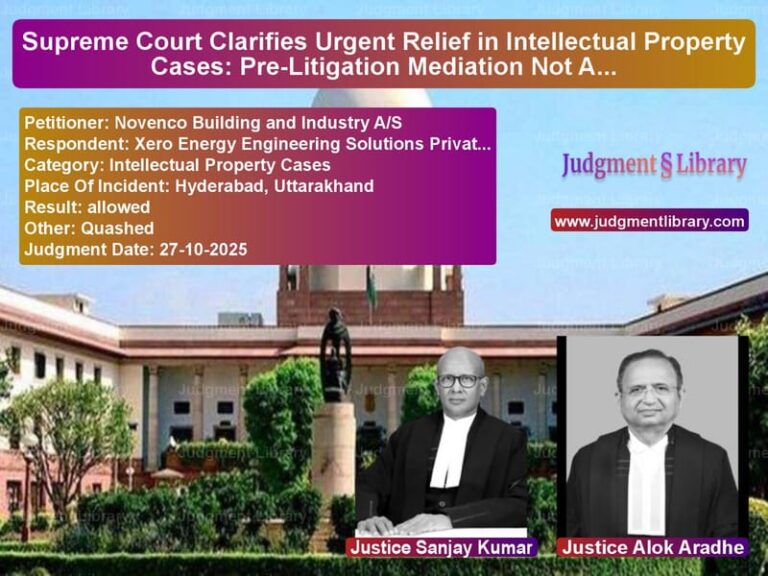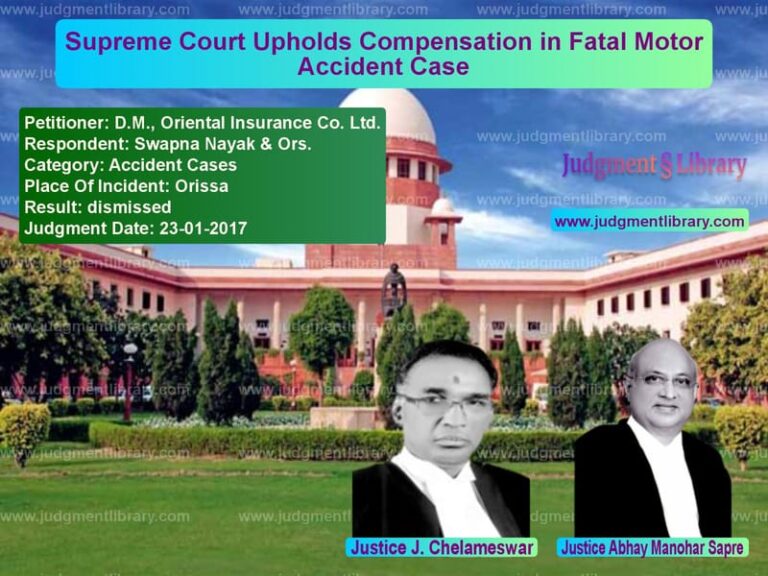Supreme Court Sets Aside CBI Investigation Order in Impersonation Case: Key Legal Principles Explained
The Supreme Court of India recently delivered a significant judgment in Vinay Aggarwal vs State of Haryana & Ors, setting aside a Punjab & Haryana High Court order that had directed CBI investigation in an alleged impersonation and extortion case. The judgment, delivered on April 2, 2025, clarifies important legal principles regarding when higher courts can transfer investigations to the CBI.
Detailed Case Background
The case originated from FIR No.215/2022 registered at PS Sector 20, Panchkula (Haryana) against Vinay Aggarwal under various sections of IPC including 120B (criminal conspiracy), 420 (cheating), 467 (forgery of valuable security), 468 (forgery for purpose of cheating), and 506 (criminal intimidation). The complainant, Jagbir Singh (respondent no.3), alleged that Aggarwal impersonated as an Inspector General (IG) of Intelligence Bureau (IB) and coerced him to transfer Rs.1.49 crore to Aggarwal’s account.
Prior to this, another FIR (No.01/2022) had been registered against Aggarwal at PS CID-Bharari, Shimla (Himachal Pradesh) on similar allegations. The Himachal Pradesh High Court had quashed this FIR on January 10, 2025, observing that it appeared to be an abuse of process of law to settle civil disputes.
Key Arguments Presented
Appellant’s (Vinay Aggarwal) Contentions
- The two FIRs (Himachal Pradesh and Haryana) were based on similar allegations
- The Himachal Pradesh High Court had already quashed one FIR recognizing it as abuse of process
- The money transfers were actually loan transactions between business associates
- No valid grounds existed for transferring investigation to CBI at initial stage
- The complainant knew appellant since 2019 and allegations of recent discovery of impersonation were unbelievable
Respondent’s (State/Complainant) Contentions
- Appellant was masquerading as IB officer and seen with Haryana police officials
- Local police may not conduct impartial investigation due to appellant’s connections
- Matter involved high-ranking officials requiring CBI investigation
- Appellant had extorted money by putting undue pressure
Court’s Detailed Analysis
The Supreme Court bench comprising Justices Sudhanshu Dhulia and K. Vinod Chandran made several crucial observations:
On Similarity of FIRs
“We may not agree with the contentions of the appellant that the two FIRs, the one which has already been quashed and the second in which the investigation has now been handed over to the CBI vide the impugned order, are broadly similar in nature. They relate to different incidents and may have a different cause of action though some incidents narrated in one do relate to the other…”
On Premature Transfer to CBI
“What is difficult for us to comprehend is that when the present FIR itself was filed on 22.10.2022 and the investigation itself was in its initial stage, then what was the burning hurry for the complainant to approach the High Court under Section 482 CrPC as early as January 2023 seeking an investigation by CBI instead of local police.”
On Credibility of Allegations
“Vague and bald allegations were made in the Section 482 CrPC petition such as that the appellant was seen masquerading as an IB officer, and he was seen in the company of policemen of Haryana, etc… These claims of the complainant are not substantiated at all.”
On Complainant’s Conduct
“The complainant had admitted that he knew the appellant since 2019 as they were doing business together and even if we assume that the appellant was impersonating himself as an IPS officer, it is difficult to believe that complainant was not able to find out the truth till October 2022.”
Legal Principles on CBI Investigations
The Court extensively discussed the law regarding transfer of investigations to CBI, citing the landmark 5-judge bench decision in State of W.B. v. Committee for Protection of Democratic Rights (2010):
“70….Insofar as the question of issuing a direction to CBI to conduct investigation in a case is concerned, although no inflexible guidelines can be laid down to decide whether or not such power should be exercised but time and again it has been reiterated that such an order is not to be passed as a matter of routine or merely because a party has levelled some allegations against the local police. This extraordinary power must be exercised sparingly, cautiously and in exceptional situations where it becomes necessary to provide credibility and instil confidence in investigations or where the incident may have national and international ramifications or where such an order may be necessary for doing complete justice and enforcing the fundamental rights.”
The Court further observed:
“The High Courts should direct for CBI investigation only in cases where material prima facie discloses something calling for an investigation by CBI and it should not be done in a routine manner or on the basis of some vague allegations. The ‘ifs’ and ‘buts’ without any definite conclusion are not sufficient to put an agency like CBI into motion.”
Court’s Findings and Decision
After thorough examination, the Supreme Court concluded:
- The High Court erred in directing CBI investigation at preliminary stage
- Allegations against local police were vague and unsubstantiated
- A Special Investigation Team (SIT) under ACP was already constituted
- Case didn’t meet exceptional circumstances threshold for CBI probe
- High Court’s order dated 17.05.2024 was unsustainable
The Court accordingly:
- Allowed the appeal and set aside High Court’s order
- Disposed of connected criminal appeal (Diary No.33284/2024)
- Discharged notices in Contempt Petition (C) No.772/2024 after accepting CBI officer’s unconditional apology
- Clarified observations were limited to CBI transfer issue and shouldn’t affect ongoing investigation
Key Legal Principles Established
- Exceptional Nature of CBI Transfers: Courts can’t direct CBI investigations routinely or based on unsubstantiated allegations
- Threshold for Transfer: Requires exceptional circumstances like national ramifications or need to instill investigation credibility
- Premature Transfers Discouraged: Shouldn’t be ordered at initial investigation stages without compelling reasons
- Burden of Proof: Parties seeking transfer must substantiate allegations against local police
- Alternative Mechanisms: Constitution of SITs can address concerns about local police impartiality
Contempt Proceedings Against CBI
The judgment also dealt with contempt proceedings against CBI for registering FIR on 09.07.2024 despite Supreme Court’s stay order dated 27.06.2024. The Court accepted unconditional apology from Dr. Navdeep Singh Brar, IPS (CBI Special Crime Branch head), noting:
“He has deposed that FIR dated 09.07.2024 was registered by mistake since CBI was not made aware of this Court’s interim order. He has further deposed that once CBI got to know about this Court’s order, all remedial steps were taken in the matter including the return of case papers to Haryana police.”
Conclusion and Implications
This judgment reinforces several important aspects of criminal jurisprudence:
- Maintains careful balance between ensuring fair investigations and preventing misuse of CBI transfer mechanism
- Protects against frivolous attempts to derail ongoing investigations
- Clarifies evidentiary standards required for transferring cases to CBI
- Reaffirms that allegations against local police must be specific and substantiated
- Emphasizes that civil disputes shouldn’t be given color of criminal cases unnecessarily
The Supreme Court’s detailed reasoning provides valuable guidance for lower courts handling similar petitions seeking transfer of investigations to CBI.
Petitioner Name: Vinay Aggarwal.Respondent Name: State of Haryana & Ors.Judgment By: Justice Sudhanshu Dhulia, Justice K. Vinod Chandran.Place Of Incident: Panchkula, Haryana.Judgment Date: 02-04-2025.
Don’t miss out on the full details! Download the complete judgment in PDF format below and gain valuable insights instantly!
Download Judgment: vinay-aggarwal-vs-state-of-haryana-&-o-supreme-court-of-india-judgment-dated-02-04-2025.pdf
Directly Download Judgment: Directly download this Judgment
See all petitions in Fraud and Forgery
See all petitions in Extortion and Blackmail
See all petitions in Attempt to Murder Cases
See all petitions in Money Laundering Cases
See all petitions in Contempt Of Court cases
See all petitions in Judgment by Sudhanshu Dhulia
See all petitions in Judgment by K. Vinod Chandran
See all petitions in allowed
See all petitions in supreme court of India judgments April 2025
See all petitions in 2025 judgments
See all posts in Criminal Cases Category
See all allowed petitions in Criminal Cases Category
See all Dismissed petitions in Criminal Cases Category
See all partially allowed petitions in Criminal Cases Category







